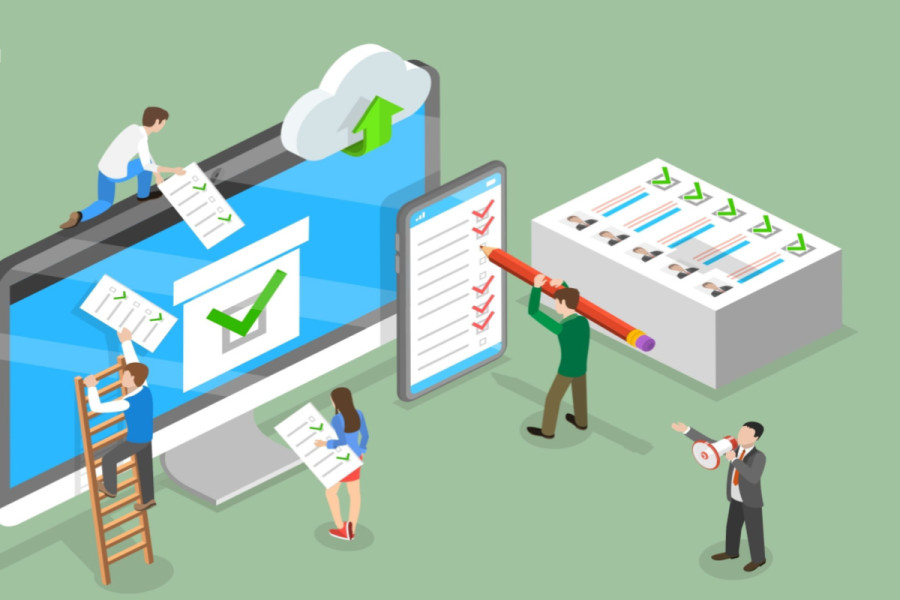Columns
Need a unified data repository
Nepal must ensure that data is accessible, usable and actionable at all levels of government.
Nischal Dhungel
The digital age represents a transformative era characterised by the extensive use of digital technology in various aspects of human life, including politics, economy and social interactions. It is driven by incorporating and assimilating cutting-edge digital technologies, such as fifth-generation (5G) mobile networks, the Internet of Things (IoT), cloud computing, artificial intelligence, big data analysis and robotics. This signifies a transition from a hyperconnected world to a realm of digitised economies and societies. These developments blur the distinction between digital and traditional economies and foster disruptive technologies that fuel growth and innovation, shaping what economists call a “digital economy”.
Initiated in the 1970s with the advent of the microprocessor and personal computer, the digital revolution, driven by information and communication technologies (ICTs), has profoundly transformed our lives. At the core of this transformation lies a techno-economic paradigm (TEP), a framework guiding innovation and investment. Many view the digital revolution as a new TEP, with data propelling the digital revolution forward. The application of data within the digital revolution will remain the driver for economic growth and innovation in the future.
Data access and sharing
Data access and sharing can yield substantial social and economic advantages of three kinds: Direct, indirect and induced. Direct benefits primarily serve the data provider, increasing revenue and productivity; indirect benefits extend to suppliers and data users, fostering the creation of new products and services; and induced benefits reach the broader economy, fostering enhanced innovation and productivity. The extent of these benefits depends on the specific sector, the nature of the data and the method of sharing.
Nevertheless, numerous studies have demonstrated significant benefits. For instance, when it comes to public-sector data, enabling data access and sharing has shown the potential to yield social and economic advantages equivalent to 0.1-1.5 percent of GDP. For private-sector data, the benefits of data access and sharing have been found to account for 1-2.5 percent of GDP, with some studies suggesting even higher figures, up to 4 percent. Data access and sharing benefit innovation, decision-making and efficiency. Sharing data enables governments, businesses and organisations to access new ideas and insights, leading to the development of innovative products, services and processes. It also improves decision-making by providing deeper insights into the economy, customers, markets and competitors.
Weak digital foundations
The fundamental pillars in Nepal necessary for ensuring resilient digital service delivery are not very robust. The United Nations e-Government Development Index ranks Nepal 132 out of 193 countries. This ranking reflects a low standing due to significant weaknesses or absences in crucial elements of the digital government ecosystem. Insufficient infrastructure capabilities, such as limited capacity and resilience of government data centres, hinder public and private service delivery.
Additionally, there are issues related to poor coordination among government agencies, constraints in institutional capacity, inadequate funding and deficiencies in foundational elements like identification and digital signatures. Building a solid foundation on these issues will be crucial for Nepal to graduate to a middle-income country, as it aims to transform a knowledge-based economy with ICT playing a pivotal role in driving its growth.
Data centricity and API
Nepal must recognise the significance of data centricity, ensuring that data is accessible, usable and actionable at all levels of government. Governments should strengthen public trust by openly publishing data sets, free for public use, in formats that prevent information manipulation. This commitment to open government data aids in enhancing transparency, combating corruption and bolstering public sector accountability. The growing interest in open-source software is also contributing to development efforts. Leveraging open application programming interfaces (APIs) will further streamline access to public sector information through user-friendly applications, benefiting citizens.
The world is witnessing a surge in API development and the prominence of open data. Integrating online public data with mobile applications will become more commonplace, and open APIs play a vital role in this process, especially with the digitalisation of back-office operations. This advancement ensures government agencies can efficiently offer access to core information and transactional systems via accessible interfaces.
Private sector collaboration
The government can collaborate with private sector entities like GivingbackAI, which aims to create publicly available databases and information ecosystems from various government levels. Currently in its initial stage, GivingbackAI is focused on providing reliable data and making them accessible through its portal. They have introduced the OpenSourceNepal API, explicitly focusing on maintaining data repositories. The API has already been released for administrative units and economic data such as remittance, forex reserve, import and export. It is crucial to adopt these APIs and dashboards to avoid duplicating efforts. Various stakeholders like governments, businesses and researchers can build custom solutions using this API.
GivingbackAI aims to maintain publicly available data to facilitate evidence-based, data-driven decisions in Nepal, addressing local development issues. When the data is available on the GivingbackAl platform, policymakers and the general public can understand how current policies are successfully implemented or how the government can efficiently allocate resources to implement the policies at the grassroots level. The government can leverage technology to bring cutting-edge solutions to complex engineering, business and societal problems by supporting such innovative businesses.
Developing efficient and effective public data can enhance transparency, accountability and user empowerment. Moreover, GivingbackAI also has an education component known as Givingback AI Education, offering free hands-on courses on how to use its API, data visualisation etc., which esteemed software engineers train to produce the next generation of tech leaders in the country. GivingbackAI adopts a two-way approach, working with governments to shape AI development and with grassroots economies to empower local communities. The goal is to achieve sustained equilibrium for prosperity and inclusive growth.
More digital infrastructure
Nepal is well-positioned to improve its digital infrastructure and climb the development ladder. Economic Survey 2022-23 findings indicate that 95 percent of the total population has access to electricity, while internet usage is reported at 130.64 percent of the total population. The Internet is essential for Nepal’s digital economy, and the country’s technology and communication sector has grown significantly. The government is testing 5G technology alongside existing 3G and 4G services. The country has already shown great success with digital adoption, increasing mobile and Internet penetration. This is higher than many other developing countries in South Asia, and it is predicted that Nepal will have the highest Internet penetration by 2025.
Nepal’s future relies on digitalisation and digital governance, and this requires investing in digital infrastructure and promoting digital literacy. While there has been some progress in data sharing, there are efficiency issues that need to be addressed. The government launched initiatives like the Digital Nepal Framework 2019 to make Nepal a digital hub. To materialise the DNF, heavy investment in infrastructure, such as broadband internet and data centres, is needed to maintain a central data repository for informed decision-making, tracking development progress, and assessing development results. Leveraging open APIs and collaborating with private sector entities like GivingbackAI can further enhance data accessibility and streamline access to public information, benefiting citizens and promoting transparency.




 20.12°C Kathmandu
20.12°C Kathmandu















